by Daniel Hathaway
Pierre Boulez first treated Cleveland Orchestra audiences to Maurice Ravel’s complete ballet music for Daphnis et Chloé in 1970. As part of the orchestra’s 90th birthday tribute to the French composer and conductor who has maintained a long-term relationship with the ensemble, Franz Welser-Möst revisited Ravel’s wonderful score on Thursday evening for the first of three concerts in Severance Hall. Though — as the song goes — the weather outside was frightful, The Cleveland Orchestra and Chorus lit a delightful indoor fire full of sensual warmth and ecstasy. [Read more…]




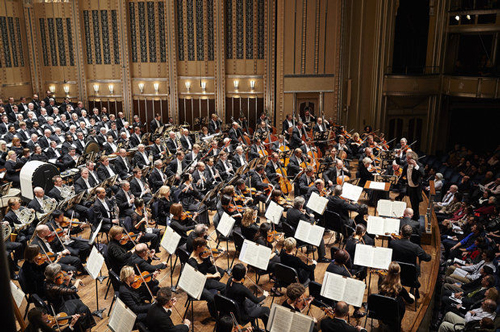
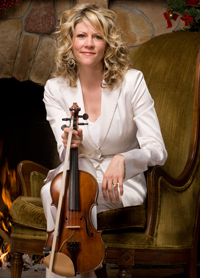 It’s all about the holidays this week at Severance Hall. On Wednesday, December 17 at 7:30 pm, Brett Mitchell will lead The Cleveland Orchestra and renowned Cape Breton fiddler Natalie MacMaster in “Christmas in Cape Breton,” a special show that mixes folk and Celtic styles with Holiday favorites and Nova-Scotian jigs.
It’s all about the holidays this week at Severance Hall. On Wednesday, December 17 at 7:30 pm, Brett Mitchell will lead The Cleveland Orchestra and renowned Cape Breton fiddler Natalie MacMaster in “Christmas in Cape Breton,” a special show that mixes folk and Celtic styles with Holiday favorites and Nova-Scotian jigs.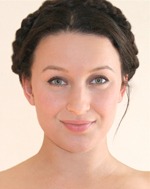 Pietism and fatalism inspired the disquieting poetic images that soprano Yulia Van Doren and the Cleveland Orchestra and Chorus presented in works by Johann Sebastian Bach and Johannes Brahms last Thursday night in Severance Hall. Those depressing thoughts might have put a damper on the proceedings, had not the music in both cases been so appealing.
Pietism and fatalism inspired the disquieting poetic images that soprano Yulia Van Doren and the Cleveland Orchestra and Chorus presented in works by Johann Sebastian Bach and Johannes Brahms last Thursday night in Severance Hall. Those depressing thoughts might have put a damper on the proceedings, had not the music in both cases been so appealing. 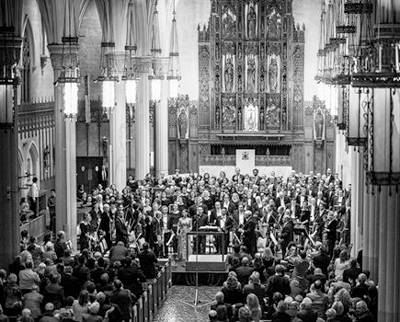 On Friday evening, October 17, a standing-room only crowd gathered in the sanctuary of Saint John’s Cathedral to hear the magnificent Cleveland Orchestra and Chorus under the direction of Franz Welser-Möst in a free concert that featured Bach’s Missa Brevis, BWV 232.
On Friday evening, October 17, a standing-room only crowd gathered in the sanctuary of Saint John’s Cathedral to hear the magnificent Cleveland Orchestra and Chorus under the direction of Franz Welser-Möst in a free concert that featured Bach’s Missa Brevis, BWV 232. 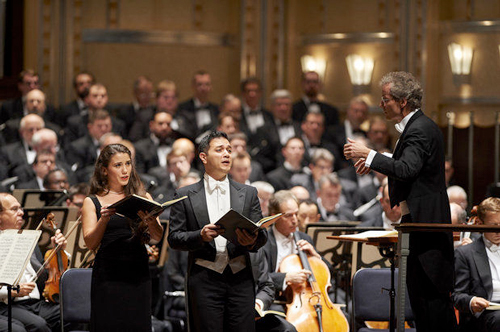 As Johann Sebastian Bach neared the end of his career, he took care to put his musical legacy in order, making archival-quality copies of Passions and completing what his son, C.P.E. Bach, called his “grosse catholische Messe.”
As Johann Sebastian Bach neared the end of his career, he took care to put his musical legacy in order, making archival-quality copies of Passions and completing what his son, C.P.E. Bach, called his “grosse catholische Messe.”  In conjunction with performances of J.S. Bach’s Mass in B Minor (October 16 and 18) and one of his solo cantatas by soprano Yulia van Doren (October 23, 24 & 24), The Cleveland Orchestra, Cleveland Orchestra Chorus and Youth Chorus will offer a free concert of the Kyrie and Gloria from the Mass at St. John’s Cathedral in downtown Cleveland on Friday, October 17 at 8:00 pm, and a “Make Music! Marathon” at Severance Hall on Saturday afternoon, October 18.
In conjunction with performances of J.S. Bach’s Mass in B Minor (October 16 and 18) and one of his solo cantatas by soprano Yulia van Doren (October 23, 24 & 24), The Cleveland Orchestra, Cleveland Orchestra Chorus and Youth Chorus will offer a free concert of the Kyrie and Gloria from the Mass at St. John’s Cathedral in downtown Cleveland on Friday, October 17 at 8:00 pm, and a “Make Music! Marathon” at Severance Hall on Saturday afternoon, October 18. 
 This week at Severance Hall conductor David Robertson will lead The Cleveland Orchestra and Cleveland Orchestra Chorus in four performances of Mozart’s beloved Requiem with guest soloists Jessica Rivera, soprano, Elizabeth DeShong, mezzo-soprano, Garrett Sorenson, tenor and John Relyea, bass-baritone.
This week at Severance Hall conductor David Robertson will lead The Cleveland Orchestra and Cleveland Orchestra Chorus in four performances of Mozart’s beloved Requiem with guest soloists Jessica Rivera, soprano, Elizabeth DeShong, mezzo-soprano, Garrett Sorenson, tenor and John Relyea, bass-baritone.
